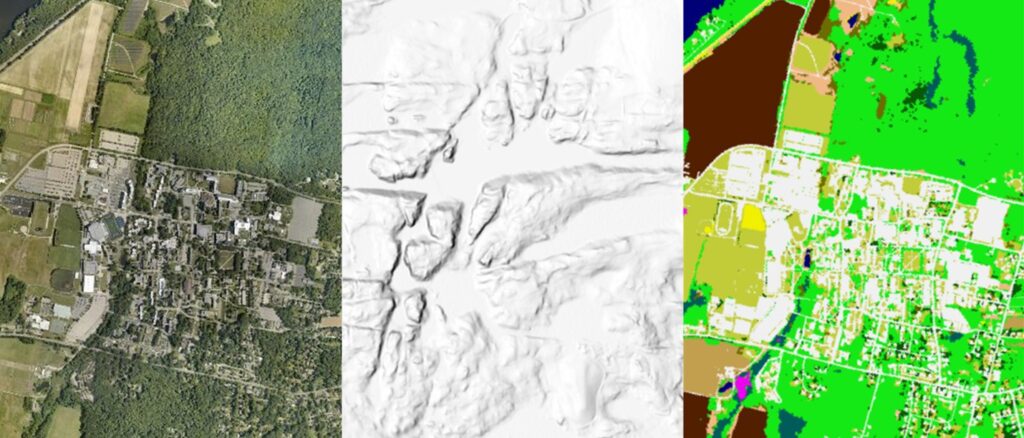
Geospatial technologies are a key resource for a wide range of fields. The skills to harness these technologies are highly sought by a variety of employers including municipal, state, and federal government, academia, businesses, environmental consulting agencies, and the military. The URI Graduate Certificate in Geographic Information Systems and Remote Sensing (GIS/RS) provides students with advanced training in using geospatial technologies and equips them with the tools to solve spatial problems. Course work covers essential concepts and focuses on practical applications relating to environmental issues. Students who complete the program will be able to:
- find existing geospatial datasets from a variety of sources;
- create new datasets through on-screen digitizing or collecting GPS data in the field;
- process and classify satellite and aerial imagery to map features of interest;
- analyze data using advanced workflows in ArcGIS Modelbuilder and Python scripting;
- present data using static maps, interactive web maps, and other web-based tools (e.g. Story Maps, Dashboards, etc.).
Elective courses will provide students with specialized skills in topics such as Python scripting, landscape pattern analysis, marine remote sensing, coastal resilience, and spatial statistics. Students will become proficient with the latest in Esri’s software suite (e.g. ArcGIS Pro, ArcGIS Online) which dominates the geospatial industry. Graduates of the program will be well-positioned to seek a career as a GIS professional or transition into a professional Masters program.
Requirements
The following courses are required:
NRS410 – Fundamentals of GIS (3 cr).
NRS509 – Concepts of GIS and Remote Sensing in Environmental Science (4 cr)
NRS522 – Advanced GIS Analysis of Environmental Data (3 cr)
NRS516 – Remote Sensing in Natural Resources Mapping (3 cr)
or NRS415 Remote Sensing of the Environment (3 cr)
Plus 3 credits from the following elective courses:
NRS524 – Application of Advanced Spatial Analysis (1 cr)
NRS528 – Geographical information systems in Python (3 cr)
NRS533 – Landscape Pattern and Change (3 cr)
GEO535 – Geospatial Watershed Modeling (3 cr)
MAF465 – GIS Applications in Coastal and Marine Management (3 cr)
STA515 – Spatial Data Analysis (3 cr)
OCG555 – Modern Oceanographic Imaging and Mapping Techniques (3 cr)
OCG665 – Marine Bio-Optics and Remote Sensing (3 cr)
Admission requirements
Bachelor’s degree from an accredited College or University. International students are required to have an overall TOEFL score of 80 or more AND meet the minimum in each individual area: Reading 20, Writing 22, Listening 17, Speaking 17.
Accelerated Bachelor to Certificate (ABC) Program
Through the ABC program, undergraduate students at the University of Rhode Island can double-count up to three-fourths of the total credits required for the certificate (i.e. 12 credits) toward both the undergraduate degree and the certificate (see Graduate School Manual Appendix K for details). Students accepted into the certificate program are automatically enrolled in the ABC program. Undergraduate students must take 1 additional graduate-level credit (i.e. NRS 591 – Special Problems) after graduation to complete the certificate program.
Masters of Environmental Science and Management Program
This certificate can be counted toward the Masters of Environmental Science and Management Program (MESM).
Application Instructions
Submit an online application through the URI Graduate School.
You will need to provide: (1) college transcripts certifying successful completion of a bachelor’s degree, (2) two letters of recommendation from peers, mentors, or colleagues attesting to your ability to complete graduate-level coursework, and (3) a personal written statement explaining why you are seeking a graduate certificate in GIS/RS. GRE’s are not required.
Applications for Fall semester admission should be completed by 10 August and applications for Spring semester admission should be completed by 1 December.
Cost
Standard URI tuition and fee rates for graduate programs apply for the Certificate in GIS and Remote Sensing.
Once in the program
The Graduate Certificate in GIS and Remote Sensing is treated as full-fledged graduate program of the University of Rhode Island. Students must follow standard graduate school guidelines, policies, and deadlines as they navigate the certificate. Important information resources for new students in the program can be found at:
The URI Graduate School
Grad School Forms
New students should meet with Dr. Jason Parent to develop a Program of Study. The Program of Study lists all the classes the student must take to complete the requirements for the certificate.
In the student’s final semester, a Intent to Graduate form must be completed.
Frequently Asked Questions
- Can credits in GIS/RS classes taken for another graduate degree count toward the certificate? Yes, as long as you are enrolled in both programs at the same time.
- Can I transfer in credits taken before being admitted? Yes, you can transfer in 3 credits of graduate GIS/RS classes and apply them toward your certificate.
- I have already taken NRS409, NRS410, and NRS516 as an undergraduate, what do I do? Drs. Wang and August will approve substitute classes for your Program of Study. You will work this out with them.
- How long does it take to get through the certificate program? It depends if you are a part-time or full-time student. It is possible to complete all the required classes in two semesters if you start in the Fall.
Contact
For more information, contact Dr. Jason Parent (jason_parent@uri.edu)
